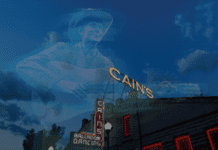Shelby Eicher makes music.
The Sand Springs resident has been at it ever since he was a kid in Ohio, playing in his family’s square-dance band. And he’s been earning a living at it for quite some time now, most notably during his 15-year run as a member of Roy Clark’s band and, following that, as an in-demand regional performer in all sorts of aggregations – including, most recently, the Tulsa Playboys (among others). A multi-instrumentalist who can also sing and compose, he’s known as a top practitioner in each of those categories.
But, as is the case with many other professions, these have been hard times for music makers. The pandemic shuttered clubs and other venues, festivals were postponed, and people who depended on entertaining others for their livings suddenly found themselves with diminished ways of getting that goal accomplished.
So what did Eicher do? Like everybody else affected by these unusual times, he did whatever he could. For him, as you might imagine, it still revolved around making music.
“In three days back in 2020, my whole year [of engagements] was canceled,” he recalls. “So I was sitting here at the house for a couple of days, and I was thinking, ‘My gosh. What am I going to do?’
Then I thought, ‘Well, I’ve got my studio here. I should do a project, maybe.’
“I was just trying to think of something I could productively do. And I remembered a tune I had started recording about three years ago, called ‘I Didn’t Realize.’ I’d always loved it, and I wanted to do a big-band arrangement with it. I thought it was a hip tune; it’s my favorite Bob Wills song.”
With “I Didn’t Realize” as a starting point, Eicher began thinking of other numbers that might fit into the same sort of swing groove. The next two he came up with were his own compositions, co-written with the Cherokee Maidens’ Robin Macy. One, “Longing for Tulsa and You” – a tribute to the great western-swing and country songwriter Cindy Walker – had been recorded by Macy’s group; the other, “Remember Me,” had not.
“I always write instrumentals, and either somebody else writes words or they stay instrumentals,” Eicher notes with a chuckle. “With ‘Longing for Tulsa,’ they [the Cherokee Maidens] were getting ready to do an album, going through tunes, and they asked if anybody had anything they could record.”
Eicher, who was on hand as a member of the Cherokee Maidens’ band, Sycamore Swing, couldn’t come up with a thing he’d written that would be appropriate. Then, he says, “a couple of days later, I thought, ‘Hey, I’ve got an instrumental I wrote, which I’d titled ‘Song for Cindy.’ I’d made a demo with twin fiddles, and I emailed it to them.
“First thing next morning, I got a response: ‘Whoa – we’re gonna record this tune.’
“I called Robin and said, ‘It doesn’t have any lyrics.’ She said, ‘I’ll write lyrics for it. What direction do you want me to go?’
“The concept for me was that it was a song about Cindy Walker. But then I thought, ‘What if it’s a love song, about losing a love, but it’s really about losing Cindy Walker, about never hearing new songs from her, or being around her any more?’ Robin took that premise, and when she came up with those words, oh, man, it was awesome.
“To me,” he concludes, “Robin writes lyrics like Cindy would – like a Bob Wills song from years ago. She’s got a real ability to channel that kind of writing.”
Interestingly enough, as the project came together, it picked up an actual Cindy Walker composition. “Baby, That Would Sure Go Good” appeared on Bob Wills’ swan-song album from 1974, For the Last Time. On Eicher’s project, it’s sung by another top area performer, Janet Rutland, who also happens to be his wife. With her grounding in country music – she was, among other things, the well-received star of a ton of local productions of the noted musical, Always . . . Patsy Cline – Rutland turned out to be a perfect choice, imbuing the lyrics with a knowing, laid-back warmth, buoyed by her husband’s fiddle-laced arrangement.
As things turned out, getting the right vocalist for “Baby, That Would Sure Go Good” came a lot easier than getting the rights to the song.
“I looked up the publishing company, found it, and went to pay [for the recording rights] – and I couldn’t pay,” Eicher remembers. “Somehow, the company had gone under. It was just defunct.”
Although Eicher is ready with the cash if the song’s copyright holder ever appears, he also recorded several other numbers that were either his own instrumental compositions or songs in the public domain, which meant that he didn’t have to pay for them. A couple of the latter feature still another great local talent, guitarist Tommy Crook, with whom Eicher has long performed – currently, at the Oklahoma Jazz Hall of Fame’s Eicher Wednesday shows.
“Those are tunes we play together that are fun, and are also public domain, so they were old enough I didn’t have to spend any money on them [for rights],” he points out.
While all of the numbers he’s assembled for the disc are important to Eicher, one of those vintage songs he mentions carries special meaning. It’s the ragtime tune “Stumbling” by pianist Zez Confrey, which was first published in sheet-music form back in 1922.
“I’ve had a connection to that tune in many different ways,” he explains. “When I was in Roy’s band, we used to play it live. We ended up playing it on The Tonight Show. And then, years later, I got a DVD about the life of [famed jazz violinist] Stephane Grappelli. Before he was a jazz player, he was in a café, after his gig or getting ready to go to a gig, and he always played the same records [on the café’s early version of a jukebox]. This time, he accidentally pushed the wrong button, and “Stumbling” played. Because of that, he decided he wanted to learn how to play jazz.
“Of course, he’s been my favorite jazz guy forever,” he says. “So there’s another connection to that same tune.”
In addition to Crook and Rutland, the now-completed CD – titled, simply, Swing – boasts a stellar lineup that speaks to Eicher’s stature as a musician. Bassist Nathan Eicher and mandolinist Isaac Eicher, who both have impressive credentials on their own, join their parents on the project, as do Eicher’s Tulsa Playboys bandmates Steve Bagsby (steel guitar), Spencer Sutton (piano) and Mike Bennett (trumpet). Also on hand are top-drawer jazzmen Scott McQuade on piano and Steve Wilkerson on clarinet. Eicher plays fiddles, guitar and mandola.
He describes the sound of the disc as “loosely swinging western country,” a term he also applies to the group he’s put together as a complement to the disc. That quartet, tentatively going under the name The Cherokee Maidens’ Sycamore Swing – “since most of the guys are from that band,” notes Eicher – features him and son Nathan, along with guitarist Kenny White and steel-guitarist Steve Bagsby. The Eichers and White play in Sycamore Swing, while Bagsby’s a member of the Tulsa Playboys.
“We’ll probably do more country tunes than western-swing tunes,” Eicher says, “but they’re going to be Ernest Tubb and all that old stuff.”
The official Swing release party is set for Wednesday, Nov. 10, at the Oklahoma Jazz Hall of Fame in Tulsa. For more information on the disc and the event, visit shelbyeicher.com.


























